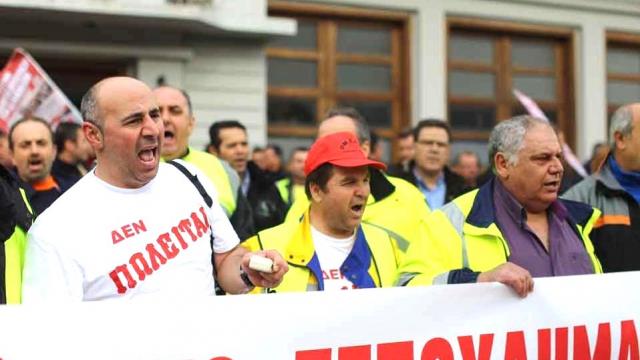
Privatization is one of those ideas that seems great on paper: by selling off public services, a government can be rid of a drain on its resources. This allows the private sector to take over, rejuvenate those assets and turn them into profitable ventures that will provide new, better paying jobs to larger numbers of people who will in turn support all the necessary tax hikes that will account for the loss of those resources.
However, if the current state of Greece is anything to go by, privatization is not the solution it's cracked up to be. By giving up parts of its infrastructure – no questions asked – in exchange for bailout funds, the country has found itself giving up its own future development assets (both in transportation and resources) without any guarantee of better service or competitive prices for its public in return.
On June 28, the Panhellenic Railway Association (POS) took to the streets in an effort to protest against the slew of public transport privatizations that were scheduled to take place later in the year. According to a statement issued by POS representatives: "We are standing in front of a tragic moment. Privatization is coming to change our life, life of the whole society. The government defiantly and shamelessly gives away the national wealth."
This statement was followed by a series of strikes that carried on until July, which served to paralyze the entire country's mass transit system. Once again, the workers had reacted powerfully to being let down by their government, which had promised to freeze any future privatization plans during its election campaign in 2015.
In fact, in June, Syriza's Transport Minister, Christos Spritzis, went so far as to promise that the government would put an end to any thoughts of future railway privatization. According to a recent statement issued by the minister regarding future government-funded railway infrastructure: “It is our top priority. A plan that is clearly a national plan and will upgrade our country.”
Then, on July 14, barely a week after the POS strikes, a deal was struck that sold out 100% of the Greek government's shares in TrainOSE, its major railway operator. According to sources, the Italian company Ferrovie dello Stato Italiane S.p.A purchased the public sector's transport asset for 45 million euros. This was the only bid made for the company following a failed negotiation with Russian Railways on April 15, then another with the GEK Terna company, and finally with Trenitalia.
All of this was to be expected, of course, after the Hellenic Republic Asset Development Fund (HRADF) decided to bring TrainOSE's $150 million debt back into play during the latter stages of the bidding, which led to the company being sold out for what seems a pittance – definitely a far cry from the projected 1.9 billion euro revenue that was promised in early 2016.
The development comes as no surprise, considering that TrainOSE was one of the largest contributing factors when it came to the mass transport of goods into the Eurozone. The strikes effectively served to stem the transport of goods and hurt foreign investors, who retaliated with an immediate response, after POS announced its 24-hour strike on July 12. Following the strike announcement, Cosco's Greek subsidiary, PCT SA, decided to transfer its containers through the port of Koper in Slovenia. This development was seen as a means for the company to maintain its competitiveness while striking a decisive blow against the workers' unions.
Judging by these developments, the future appears bleak. If historical precedent is anything to go by, the Greek privatization situation seems to be harkening back to the days of East Germany's Treuhandanstalt, when the entirety of its government assets were sold to West German private companies at fire-sale prices, creating 300 billion Deutche Marks' worth of debt in a matter of years. Much like today's HRADF, the Treuhandanstalt had been an extra-governmental organization, its authority based on international treaties, with the express purpose of facilitating an ailing country's privatization of its assets.
Even Deutche Bank AG, one of the staunchest defenders of privatization (which went so far as to advocate the privatization of water resources within the Eurozone) couldn't help but notice the stark similarities of the situation and attempted to address the issue of Greece's catastrophic fire sale as early as last year. Fortunately, there seems to be a way to stem the privatization tide. If past developments are anything to go by, highly sensitive areas are still being defended tooth and nail. From healthcare to the government-funded water supply, any efforts to allow the involvement of private companies have been halted both by government officials as well as by the overwhelming support of the voters.
Such was the case with Thessaloniki's Water Supply & Sewage S.A (EYATH), the public service that protected any attempts to privatize Greece's water supply by maintaining an exclusive right to sell out its services through a 30-year exclusive concession agreement, effective from 2001. EYATH achieved this through an overwhelmingly successful referendum and by establishing well-organized pressure groups, such as Save Greek Water.
After all, the alternative to this resistance seems bleak: according to a recent report on the terms of the alleged Greek super-fund, the country has a 99-year span of gradual privatizations to look forward to, with only 50% of the revenue ever reaching the Greek government. It is certainly an upgrade, compared to the 90% share which the HRADF gave the country's lenders so far. But that doesn't make it seem any less like a subtler, more insidious form of occupation.
3 WAYS TO SHOW YOUR SUPPORT
- Log in to post comments













Comments
Beth Newman replied on
Mankind eat Mankind for some reason
This can't be true can it? This accomplishes the exact opposite of what really does create capital...which is the nourishment of the common good in all kinds of infinitely creative ways. That is how wealth is creating & maintained. Otherwise people end up doing meth & heroin from the CIA like in the States & everybody knows what a down hill spiral that's turned out to be. This ain't rocket science people. "Peace & goodwill towards men..." equals money in the pocket...Jesus knew this...
zion101 replied on
Guaranteed business Loans
we give out business loans to interested customer that are seeking for loan to improve their businesses, we can assist your businesses with loans. We can help you by lending you money, to start up a business or expand your existing business. Minimum amount is 3 million rub. Maximum amount is 150 million rub. To get more information email: zionfinance01@gmail.com